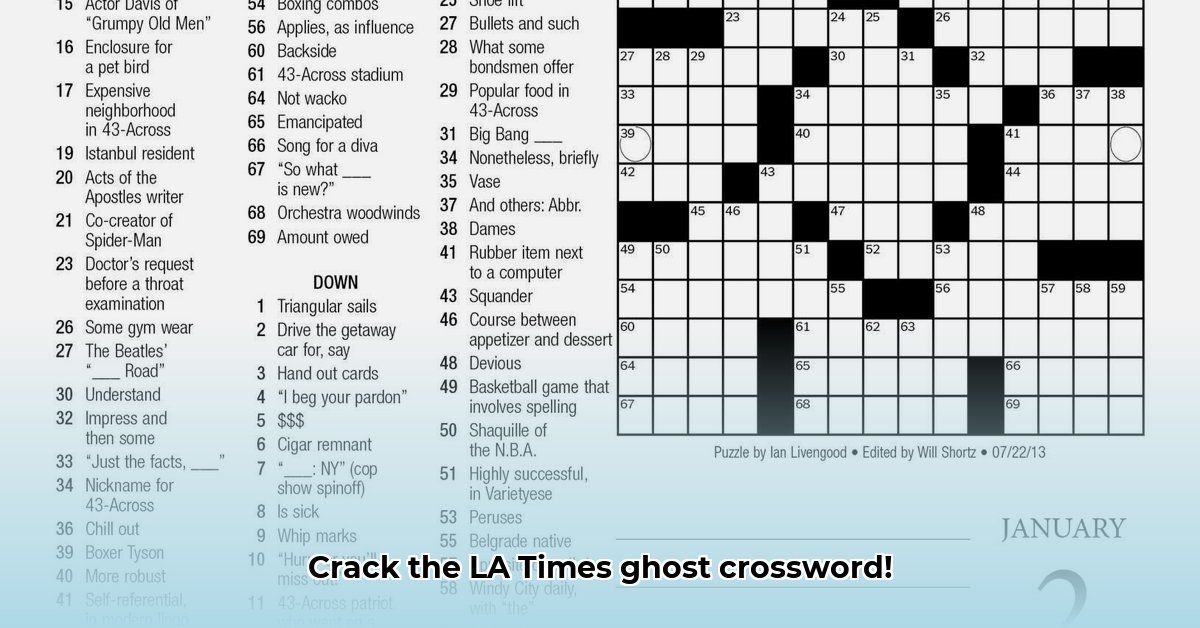Ever get stuck on a crossword clue like “ghost”? It seems simple, right? But “ghost” can mean so many things! This guide will show you how to crack even the trickiest crossword clues, using “ghost” as our spooky example. We’ll cover everything from understanding what the clue really means to using online tools and clever strategies. For more advanced techniques, check out this helpful guide: Ghost Crossword Clues. By the end, you’ll be a crossword clue-busting pro, ready to tackle any puzzle thrown your way. Let’s get started!
Ghost LA Times Crossword Clue: Expert Strategies
So, you’ve hit a snag in your LA Times crossword—the dreaded “ghost” clue staring back at you. Don’t fret! Even experienced crossword champions get stumped sometimes. This guide will arm you with the strategies to crack even the trickiest clues. We’ll turn that frustrating blank square into a satisfyingly filled one. Let’s explore the subtle art of deciphering crossword clues using the “ghost” example.
Unmasking the Mystery: Decoding “Ghost”
The word “ghost” itself is deceptively simple. On the surface, it means a disembodied spirit, a phantom, right? But in the world of crosswords, that’s just the starting point. The beauty (and the beast!) of crossword clues lies in their ambiguity. “Ghost” could also represent something intangible, a faint trace, a memory, or even a sneaky synonym like “specter,” “phantom,” “shade,” or “wraith.” It could even refer to a person who avoids contact, someone who “ghosts” others. The possibilities are much broader than you initially thought.
The key is to think outside the box – and the dictionary! This requires understanding synonyms, context hints, wordplay within the puzzle’s design, and even contemporary slang. For instance, if the puzzle leans towards modern themes, the “ghost” clue might relate to the social phenomenon of “ghosting”.
Harnessing the Power of the Internet: Online Crossword Resources
Online crossword resources are invaluable tools. Websites dedicated to providing crossword solutions can be incredibly helpful, not as definitive answer givers, but as research assistants. Sites like Crossword Solver, LA Times Crossword Answers, and various crossword clue databases can offer a starting point, providing numerous potential solutions for “ghost.” However, remember that different sites might provide slightly different solutions, reflecting the word’s multiple meanings and the puzzle’s context.
Don’t just blindly copy the first answer you see; critically evaluate it within the puzzle’s framework. Consider the source of the solution. Is it a reputable crossword site? Does the site provide context for the answer? Cross-referencing solutions across multiple resources helps refine your search and understanding. This empowers you to solve through leveraging comprehensive crossword databases.
Mastering the Art: A Strategic Approach to Solving
Solving ambiguous clues isn’t about luck; it’s about strategy. Here’s a step-by-step process to help you conquer those tricky clues:
Step 1: Size Matters: The Importance of Word Length
Before you even begin brainstorming synonyms, note the number of letters the answer requires. A three-letter “ghost” is vastly different from a ten-letter one. This single piece of information drastically reduces the field of possibilities. Knowing the length provides a clear initial constraint and helps focus your search. If the clue is “Ghost __ chance” and the answer is three letters, “OFA” is a likely candidate based on past LA Times Crosswords.
Step 2: The Power of Intersections: Cross-Referencing Clues
Look at the clues that intersect with the “ghost” clue. What letters are already filled in? This can provide vital information, eliminating possibilities and revealing crucial letters. These intersecting words often offer more clues than the main clue itself. For example, if the intersecting word ends in “T”, you know your “ghost” solution must end in “T” as well.
Step 3: Feeling the Theme: Uncovering Hidden Connections
Many crossword puzzles have overarching themes. Is there a pattern? Does the puzzle have a specific topic or style? Sometimes, the “ghost” solution isn’t a direct synonym but fits the overall theme in a clever way. If the crossword theme revolves around classic literature, for example, a “ghost” clue might refer to a character in a famous novel, thus requiring a more literary answer.
Step 4: Contextual Clues: Paying Attention to Adjoining Words
Pay close attention to the words immediately surrounding the clue. Are there quotation marks? Is the clue phrased in a playful or unusual way? This can provide hints about the type of answer the puzzle is looking for. For example, if the clue is “Ghost (past tense),” the answer might be “HAUNTED”.
Step 5: Trial and Error: A Calculated Guessing Game
Sometimes, you need to experiment. Try a few possibilities, carefully entering them into the crossword grid. If it doesn’t fit with the intersecting clues, politely erase it and try a different approach. Remember, eliminating incorrect options is just as crucial as finding the correct one. Start with the most likely answers based on your analysis, and systematically work through the possibilities.
Advanced Tactics: Leveling Up Your Crossword Game
For those seeking to truly master the craft, here are some more advanced techniques:
- Cryptic Clues: Deciphering Hidden Meanings: Some crossword clues use wordplay or cryptic phrasing. Learning to recognize these patterns can give you a significant edge. Look for puns, double meanings, or anagrams disguised within the clue’s wording. Cryptic clues often involve hidden instructions within the clue itself.
- Common Crossword Abbreviations: Mastering the Shorthand: Crosswords frequently use abbreviations. Knowing common abbreviations like “Esq.” for “Esquire,” “St.” for “Street,” or “NNE” for “North-Northeast” can save you valuable time and space. The abbreviation “OFA” could mean “one for all”.
- Common Crossword Patterns: Recognizing Familiar Faces: Crosswords often repeat common words and solutions. The more you solve, the more you’ll recognize frequently appearing vocabulary and patterns. This builds your intuition for likely answers. Learn common crosswordese, those fill words that appear repeatedly.
A Reality Check: Why Do Different Resources Offer Different Answers?
Different online resources will offer distinct solutions for the same clue. This highlights the clue’s inherent ambiguity. The “best” answer is the one that fits perfectly within the specific crossword’s framework and considers the intersecting words. A helpful strategy is to consider a variety of suggestions. Consider the date of the crossword. Older crosswords may use different language conventions than newer ones.
| Resource | Potential Solutions for “ghost” | Reasons for Variation |
|---|---|---|
| Crossword Solver | GHOUL, SPECTER, PHANTOM, WRAITH, APPARITION, SHADE etc. | Algorithm searches for various synonyms and related terms; may not consider context or theme of the specific puzzle. |
| LA Times Crossword Answers | Varies depending on puzzle date | Solution depends on the specific crossword puzzle’s design and theme for that day. |
| Online Dictionary/Thesaurus | Numerous synonyms not typically used in crosswords | Provides a broad range of synonyms without considering length constraints, intersecting letters, or crossword conventions. |
| Wordplays | Varies with clue context | Solution depends heavily on the related clues and the theme; prioritizes answers that fit the overall puzzle design. |
| General Knowledge/Google Search | “Ghosting”, “Ghost in the Machine,” Famous Ghosts etc. | Provides answers based on broader knowledge and common phrases, which may or may not be relevant to the crossword’s theme and constraints. |
The beauty of crossword puzzles isn’t just about finding the single “correct” answer (if one truly exists!). It’s about the process, the intellectual challenge, and the satisfying feeling when the pieces click into place. So, embrace the ambiguity, refine your strategies, keep practicing, and soon, even the trickiest clues like “ghost” will be easily solved. Consistent crossword solving improves vocabulary and cognitive skills, contributing to overall mental acuity.
- Good Morning Images to Share with Loved Ones - January 10, 2026
- Handsome Good Morning Message for Him Long Distance to Make Him Smile - January 9, 2026
- Find the Perfect Good Morning Handsome Gif for Him - January 8, 2026










